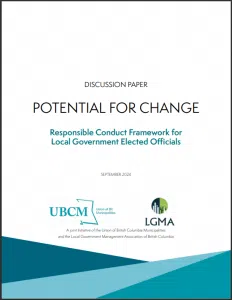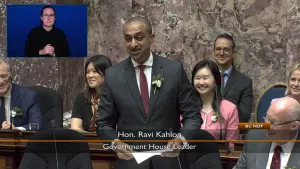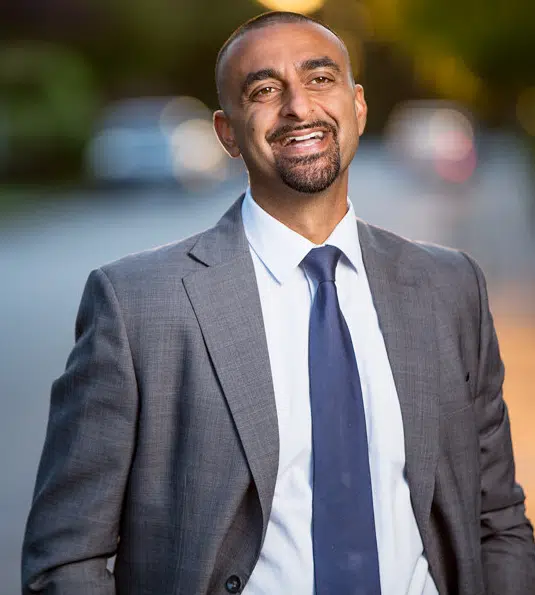
New Municipal Affairs and Housing Minister Ravi Kahlon/via Facebook
The current levels of control that local governments in BC currently enjoy could be on the verge of being eroded, thanks in part to the dysfunction at Kamloops City Hall.
“We are contemplating…we are considering changes because of challenges that have arisen in Kamloops, but also in a handful of other communities,” said Ravi Kahlon, BC’s latest Minister of Municipal Affairs, in a one-on-one interview with Radio NL.
“What happens in a community like Kamloops and happens in other communities… it has a huge impact on, not only the outcomes that people see in their community, but people’s trust in their institutions as well,” added Kahlon.
“Right now, democracies are fragile around the world.”
Kahlon has confirmed that a review of the Local Government Act and the Community Charter have been quietly underway since before he took on the Municipal Affairs portfolio as part of David Eby’s new Cabinet in mid-November.
“We’re doing a bit of analysis on that now,” noted Kahlon. “Some of the work had started because of the request of UBCM.”
The Union of BC Municipalities put the situation in Kamloops and other communities at the forefront a couple of weeks before its Annual General Meeting this year, through the circulation of a discussion paper on September 5, 2024.
Crafted out of seven years worth of requests and resolutions, the discussion paper put together by the UBCM and the Local Government Management Association — representing local government staff — calls for “additional tools to promote responsible conduct and enforce responsible conduct standards.”
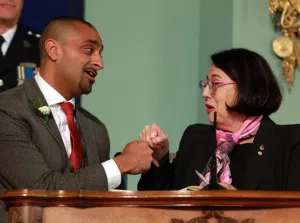
Ravi Kahlon fist-bumps Lieutenant-Governor Janet Austin during swearing-in as Minister of Housing and Municipal Affairs, Nov. 18, 2024/via Chad Hipolito, The Canadian Press
Options floated for consideration
While the discussion paper contends that it wasn’t crafted to “recommend policy,” it does provide three different options which the Province can head toward.
Model I would not be a lot different from what is currently in-place in Kamloops and around three-quarters of the other communities in BC — the creation of a Code of Conduct that local government bodies are in charge of determining for themselves.
That option puts the onus on the local governments to decide the scope and scale of the rules, and whether they want to hire a third-party investigator to look into any Code violations.
This suggestion from UBCM comes even though the Province decided in 2022 to mandate Code of Conduct adoption within six months of a local government’s swearing-in following local elections — but with exemptions for those which could provide a reason not to.
The discussion paper contends this has created a scatter-shot approach among local councils and boards which have already chosen this path, while also noting around 30% of BC’s local governments – which include municipal councils, regional district boards and school boards – hadn’t bothered to adopt a Code of Conduct as of September 5, 2024.
“Based on current application, it is not clear that this model would address the existing framework’s shortcomings,” noted the paper.
Model II would bounce the ball into Victoria’s hands through the creation of a Provincial-level office tasked with Code of Conduct violations.
This could include a provincial team dedicated to reviewing all complaints filed, investigating those deemed worthy of a probe, and providing follow-up recommendations on how to deal with any Code of Conduct breaches the investigator has found took place.
Model II would require a standardized, mandatory Code of Conduct for each local government in BC.
With the BC Government then being at the controls through the process, the discussion paper warns of Provincial overreach concerns, on top of the speed at which complaints could be reviewed and remedied, as well as a potential explosion of costs, which the paper says would be spread across all levels of local government.
In the case of Kamloops, the cost sharing would likely be welcomed, as well over $250,000 — likely closer to $300,000 — has already been spent during this current term of Council on Code of Conduct investigations.
In the end, the local councils and boards would still have to decide amongst themselves whether to bring down sanctions on their colleagues, should the provincial office recommend that.
“Given the novelty of such an office, there is a significant potential for unintended consequences,” the paper pointed out, noting an approach like this would be a first in Canada.
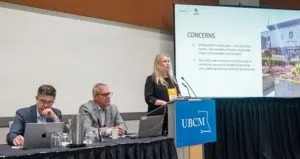
Members of 2024 UBCM conference discussing Code of Conduct issues with Kamloops City Hall visible on screen/via UBCM
Model III would appear to be the UBCM/LGMA’s preferred option, which is much like the first Model, but with much less wiggle-room for local governments to modify the Code.
While local bodies would still be allowed final say on their own Code of Conduct, it would have to be based on “robust” options the Province would provide, including the rules to follow and the consequences if they’re not.
It would also mandate that an independent third-party be appointed by each board to vet any complaints, as well as investigate and provide recommendations on sanctions.
In the end — like the previous models — any penalties for Code breakers would still be decided upon by the elected officials.
“Model III may, however, improve on the approach set out in Model I by overcoming the variability that exists in the current system,” argued the discussion paper. “Greater consistency and rigour in the administration and enforcement of codes across the sector would be the expected result.”
In floating the three Models, the UBCM paper does emphasize two things: “Disqualification” is not to be an option, and local councils and boards have the final say.
Removal from office extremely limited on local level
“Disqualification” is the euphemism used in local government circles for the sacking of an elected local official — something which has only recently become a remote possibility.
Amendments were added to the Local Government Act in June of 2022 which allow for the disqualification of those convicted of an indictable offense — serious crimes which run the risk of time in a federal prison, such as break and enter, aggravated sexual assault and murder.
Those charged with an indictable offense face a “mandatory” leave of absence, which still sees them paid and retain all their benefits until such time as they are convicted, acquitted or have the case tossed out.
If convicted, their office is immediately vacated, and even if they appeal the conviction and win, they can’t come back into office during that term.
But, the same rules dictate that person is allowed to run again in the next municipal election, as they’re only ineligible to run for, be nominated for and hold office “from the date of the conviction until the date on which the person is sentenced.”
Beyond a serious breach of the law, there are few other avenues to remove an elected member of a local council.
Those would require the Courts to determine if there were a misappropriation of funds, if an elected official didn’t show up for meetings without a valid excuse over and extended period of time, refused to take the initial Oath of Office within 45 days of being elected, or broke conflict of interest rules.
Provincial legislation has maintained a recall process since 1996 for Members of the Legislative Assembly — none of whom have ever been booted from office through it.
The last pitch made through the UBCM to the then-BC Liberal government for local recall in 2015 fell flat.
A recommendation included in Municipal Advisor Henry Braun’s April, 2024 report to Kamloops Council does suggest reviving the idea of recall at a local level.
Minister endorses Braun Report
“Mayor Braun was brought in by my predecessor to do a report,” noted Housing and Municipal Affairs Minister Ravi Kahlon as part of his conversation with Radio NL. “I fully support the recommendations that Mr. Braun brought in.”

Henry Braun delivering his municipal advisor report to Kamloops Council on May 7, 2024. (Photo via Brett Mineer)
Braun’s report was delivered in-person during a Committee of the Whole session of Kamloops Council on May 7, 2024.
Among the 13 recommendations included for Council as a collective group, Braun would recommend it “discuss the potential need for changes to provincial legislation to assist municipal councils experiencing extreme dysfunction, which may include a legislative process for removing a member of the council.”
There were also a number of suggestions made by Braun specifically for Mayor Reid Hamer-Jackson, who was identified in the report as “largely responsible for the issues, with minor contribution by Councillors in reaction.”
Calling the conflict within Kamloops Council “not normal,” but also not unique, Braun’s recommendations did include a variety of remedies for Kamloops Council, including training and team building.
However, analysis in his “final observations” were less-than-optimistic.
“As a former Mayor, it has been frustrating for me personally that I could not find an effective way to counsel the Mayor, or to find additional ‘tools’ for Council to remedy the dysfunction between Mayor and Council and between Mayor and the Administrative Staff,” said Braun in his report. “Absent significant change in how the Mayor interacts with others, I’m not optimistic that there will be any improvement during the remainder of this term.”
While he says he supports the findings of the Braun Report, Kahlon has suggested might not fully agree with the former Mayor of Abbotsford’s pessimistic outlook for Kamloops Council, suggesting there may be some room for optimism.
“Hoping Kamloops can start getting their house in order,” said the Minister. “I’ve actually had a good relationship… I’ve worked with the Mayor individually, and I’ve worked with the Council in Kamloops as a collective. We’ve been able to get a lot done in Kamloops.”
Timelines for potential changes not set
“I recognize that implementing the advice from the municipal adviser will take time,” said then-Municipal Affairs Minister Anne Kang in a statement to Radio NL in the days following the release of the Braun report.
“The Ministry of Municipal Affairs will continue to be available to provide guidance and additional support,” added Kang, in one of the rare statements made by the then-Minister during the well-documented decline in the political situation in Kamloops.
Kang — who has since moved on as Minister of Post Secondary Education and Future Skills — maintained a somewhat hands-off approach when it came to the local conflicts, which began festering within a number of municipal councils throughout the province not long after their terms began in early 2023, but most notably in Harrison Hot Springs and Kamloops.
It’s a situation that now-Minister Kahlon suggests has left a stain on the community’s reputation.
“Unfortunately, Kamloops went from [being] known as the Tournament Capital, to now being framed as the challenges surrounding Mayor and Council,” lamented Kahlon. “That’s not good. It’s not good for the City. It’s not good for the residents of the community.”
While seemingly more willing to openly discuss the political situation in Kamloops than his predecessor, Kahlon wasn’t willing to suggest when any legislative changes to the Local Government Act and/or the Community Charter could be forthcoming.
However, he did hint that they are likely.
“I can’t say right now [interviewer’s name] on the timeline,” said Kahlon. “[It’s] just that there’s a lot of agenda items that the new government is bringing forward. Where it will fit, I’m not entirely sure.”
Kahlon — well known for his battles with opposition MLA’s during Question Period — also took a moment to suggest the ‘political theatre’ should be left on stage.
“You can disagree on policies,” suggested Kahlon. “But we shouldn’t be making this thing personal.”


